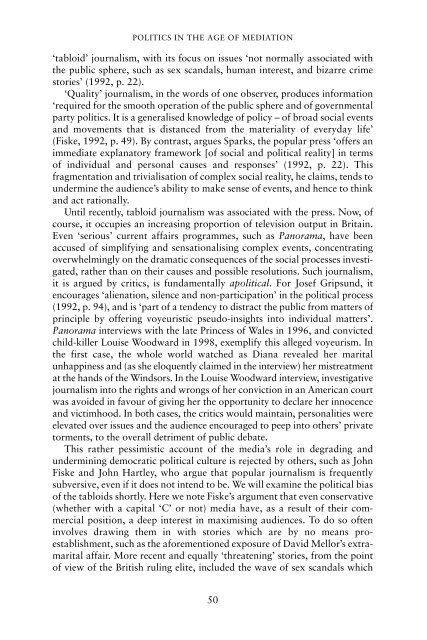20130412164339753295_book_an-introduction-to-political-communication
20130412164339753295_book_an-introduction-to-political-communication
20130412164339753295_book_an-introduction-to-political-communication
Create successful ePaper yourself
Turn your PDF publications into a flip-book with our unique Google optimized e-Paper software.
POLITICS IN THE AGE OF MEDIATION<br />
‘tabloid’ journalism, with its focus on issues ‘not normally associated with<br />
the public sphere, such as sex sc<strong>an</strong>dals, hum<strong>an</strong> interest, <strong>an</strong>d bizarre crime<br />
s<strong>to</strong>ries’ (1992, p. 22).<br />
‘Quality’ journalism, in the words of one observer, produces information<br />
‘required for the smooth operation of the public sphere <strong>an</strong>d of governmental<br />
party politics. It is a generalised knowledge of policy – of broad social events<br />
<strong>an</strong>d movements that is dist<strong>an</strong>ced from the materiality of everyday life’<br />
(Fiske, 1992, p. 49). By contrast, argues Sparks, the popular press ‘offers <strong>an</strong><br />
immediate expl<strong>an</strong>a<strong>to</strong>ry framework [of social <strong>an</strong>d <strong>political</strong> reality] in terms<br />
of individual <strong>an</strong>d personal causes <strong>an</strong>d responses’ (1992, p. 22). This<br />
fragmentation <strong>an</strong>d trivialisation of complex social reality, he claims, tends <strong>to</strong><br />
undermine the audience’s ability <strong>to</strong> make sense of events, <strong>an</strong>d hence <strong>to</strong> think<br />
<strong>an</strong>d act rationally.<br />
Until recently, tabloid journalism was associated with the press. Now, of<br />
course, it occupies <strong>an</strong> increasing proportion of television output in Britain.<br />
Even ‘serious’ current affairs programmes, such as P<strong>an</strong>orama, have been<br />
accused of simplifying <strong>an</strong>d sensationalising complex events, concentrating<br />
overwhelmingly on the dramatic consequences of the social processes investigated,<br />
rather th<strong>an</strong> on their causes <strong>an</strong>d possible resolutions. Such journalism,<br />
it is argued by critics, is fundamentally a<strong>political</strong>. For Josef Gripsund, it<br />
encourages ‘alienation, silence <strong>an</strong>d non-participation’ in the <strong>political</strong> process<br />
(1992, p. 94), <strong>an</strong>d is ‘part of a tendency <strong>to</strong> distract the public from matters of<br />
principle by offering voyeuristic pseudo-insights in<strong>to</strong> individual matters’.<br />
P<strong>an</strong>orama interviews with the late Princess of Wales in 1996, <strong>an</strong>d convicted<br />
child-killer Louise Woodward in 1998, exemplify this alleged voyeurism. In<br />
the first case, the whole world watched as Di<strong>an</strong>a revealed her marital<br />
unhappiness <strong>an</strong>d (as she eloquently claimed in the interview) her mistreatment<br />
at the h<strong>an</strong>ds of the Windsors. In the Louise Woodward interview, investigative<br />
journalism in<strong>to</strong> the rights <strong>an</strong>d wrongs of her conviction in <strong>an</strong> Americ<strong>an</strong> court<br />
was avoided in favour of giving her the opportunity <strong>to</strong> declare her innocence<br />
<strong>an</strong>d victimhood. In both cases, the critics would maintain, personalities were<br />
elevated over issues <strong>an</strong>d the audience encouraged <strong>to</strong> peep in<strong>to</strong> others’ private<br />
<strong>to</strong>rments, <strong>to</strong> the overall detriment of public debate.<br />
This rather pessimistic account of the media’s role in degrading <strong>an</strong>d<br />
undermining democratic <strong>political</strong> culture is rejected by others, such as John<br />
Fiske <strong>an</strong>d John Hartley, who argue that popular journalism is frequently<br />
subversive, even if it does not intend <strong>to</strong> be. We will examine the <strong>political</strong> bias<br />
of the tabloids shortly. Here we note Fiske’s argument that even conservative<br />
(whether with a capital ‘C’ or not) media have, as a result of their commercial<br />
position, a deep interest in maximising audiences. To do so often<br />
involves drawing them in with s<strong>to</strong>ries which are by no me<strong>an</strong>s proestablishment,<br />
such as the aforementioned exposure of David Mellor’s extramarital<br />
affair. More recent <strong>an</strong>d equally ‘threatening’ s<strong>to</strong>ries, from the point<br />
of view of the British ruling elite, included the wave of sex sc<strong>an</strong>dals which<br />
50
















